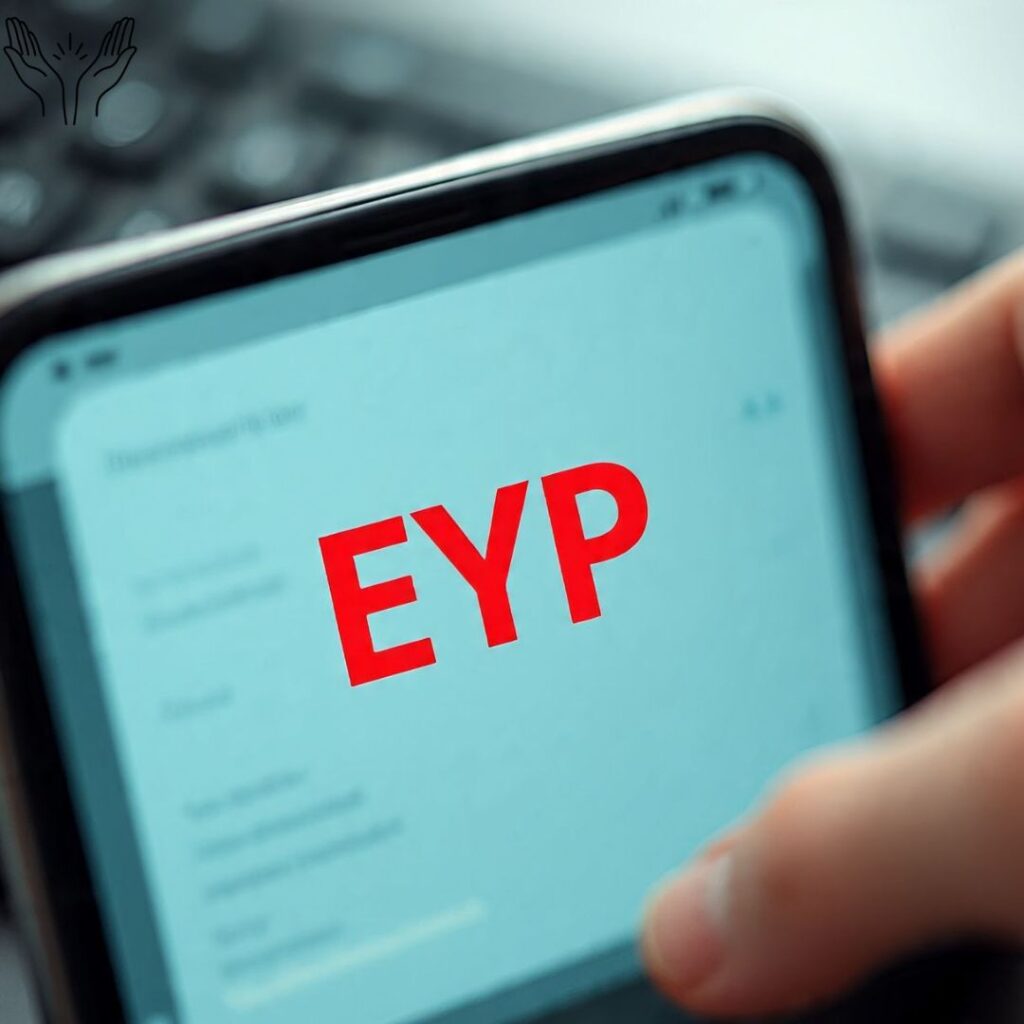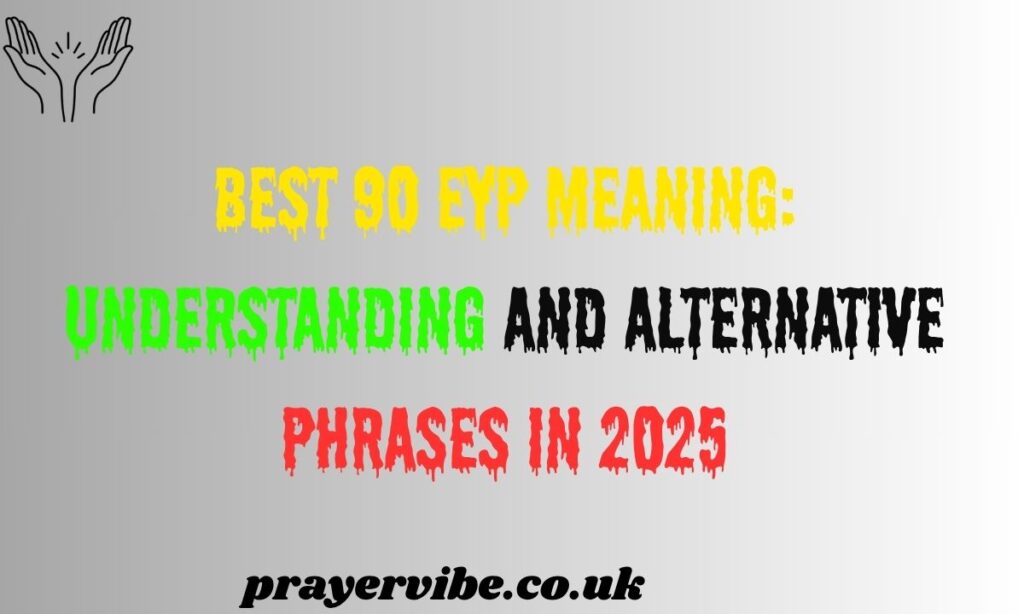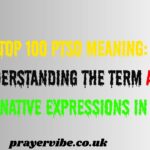The term EYP has become popular in online chats and texting in 2025. It usually means “Enjoy Your Peace”, used when someone wants to end a conversation calmly or move on peacefully. People often use it after a disagreement or when they don’t want to argue.
It can sound polite or sarcastic, depending on the tone. This guide will help you understand what EYP means, when to use it, and how to say it differently. Let’s explore the best 90 ways to understand and replace “EYP” in 2025.
🙏 Divine Prayer Generator
Select a prayer category to begin
What Does EYP Mean?

In 2025, EYP most commonly stands for “Enjoy Your Peace.” It’s a phrase often used in digital conversations, especially during moments of tension, disagreement, or emotional distance. EYP serves as a polite, sometimes passive-aggressive way to disengage from an argument or simply end a conversation.
It carries a layered meaning—on the surface, it seems kind and respectful, but context matters greatly. If said warmly, it implies sincerity and calmness. If used with sarcasm, it could come off as dismissive or cold.
Polite and Professional Alternatives to “EYP Meaning”
If you’re trying to maintain grace and avoid sounding bitter or sarcastic, choosing a polite or professional alternative to “EYP” is essential. While “EYP” can come off as passive-aggressive, these alternatives prioritize clarity, maturity, and emotional intelligence.
Here are some respectful replacements:
- “I respect your decision.”
- “Let’s leave it at that.”
- “Wishing you all the best.”
- “I hope things work out for you.”
- “Take care.”
These options convey peace and closure without negativity. They’re especially useful in work settings, online communities, or when speaking with someone you don’t want to offend. They still close the conversation but in a much softer and professional tone.
A polite alternative allows you to disengage without inviting further debate. It shows that you value resolution over conflict, which can help preserve relationships or reputations—especially in environments like remote work chats or professional networking platforms.
Formal Alternatives
When you’re writing an email, a formal message, or responding to someone in a business context, using formal language instead of slang like “EYP” is crucial. Formal alternatives avoid misinterpretation and display emotional intelligence.
Here are strong formal options:
- “I trust this brings closure to the matter.”
- “Let us move forward independently.”
- “Please feel free to reach out if you need further assistance.”
- “Our views differ, and I accept that.”
- “Let’s proceed professionally from here.”
These phrases fit well in emails, customer service exchanges, or discussions where tone is monitored and professionalism is expected. Unlike “EYP,” which might confuse or offend, these options are clear, courteous, and mindful of tone.
In formal environments, words matter. Using the wrong phrase—especially something that sounds dismissive—can damage relationships or credibility. That’s why choosing respectful, structured alternatives is key.
Professional Alternatives
While not as rigid as formal phrases, professional alternatives strike a balance between being direct and being courteous. These are perfect for workplace chats, Slack messages, or conversations with coworkers or clients.
Consider these examples:
- “Let’s agree to disagree.”
- “I appreciate your perspective.”
- “Thanks for sharing—wishing you the best.”
- “Understood. I’ll take it from here.”
- “I think we’re on different pages. That’s okay.”
These professional alternatives still allow you to step away from conflict but do so without sounding cold or dismissive. They’re especially useful in maintaining team harmony and professionalism even when viewpoints don’t align.
Using this type of language helps foster respectful environments and avoid drama or miscommunication in professional settings. It’s also a great way to show that you’re emotionally mature and not reactive.
Casual and Friendly Alternatives
Sometimes you’re not trying to be formal or professional—you’re chatting with a friend, sibling, or online mutual. In these moments, using casual and friendly alternatives to “EYP” can help maintain peace without sounding stiff or cold.
Here are more relaxed options:
- “No worries, do your thing.”
- “All good, I’m chillin’.”
- “It’s cool, I get it.”
- “Peace out ✌️”
- “Catch you later, take care.”
These are light, friendly ways to express a similar sentiment as “EYP” but without sarcasm or passive energy. They’re especially helpful in group chats, DMs, or informal settings where tone is casual and non-defensive.
By staying warm and informal, you leave room for future conversations without awkward tension. It tells the other person: “I’m stepping away, but we’re still good.” This is a great choice if you’re genuinely trying to keep peace and maintain connections.
Choosing the Right Alternative
The right alternative to EYP depends entirely on your relationship with the person, the tone of the conversation, and your desired outcome. Think about what message you’re trying to send—are you:
- Closing a disagreement?
- Walking away from a heated debate?
- Simply ending the chat on good terms?
Here’s a simple way to choose:
- Use formal phrases in business emails, academic or legal communication.
- Use professional phrases in work messages, project collaboration, or industry-related chats.
- Use casual/friendly phrases in DMs, social media, or with people close to you.
- Use polite alternatives when you want to end on kind, peaceful terms but still express distance or finality.
Also consider the emotional context—are you angry, hurt, peaceful, or indifferent? That feeling should guide your word choice. Picking the wrong tone can send mixed messages and leave the other person confused or offended.
Ultimately, good communication is about intentional language. Replacing “EYP” with a clearer alternative helps avoid misunderstandings and keeps your digital presence positive.
Texting Examples with Alternatives to “EYP”

When texting, using alternatives to “EYP” can help you express yourself more clearly and kindly. For example, if you’re ending a disagreement, you might say, “Let’s just move on, no hard feelings.”
In a casual chat, try “All good, take care!” For a professional tone, go with “Let’s agree to disagree.” These short, simple responses maintain peace without sounding rude. Choosing the right words helps avoid confusion and keeps the conversation respectful.
1. Passive-Aggressive Argument Ending
Instead of: “Fine. EYP.”
Say: “I think we both need space. Take care.”
2. Friendly Closure After a Debate
Instead of: “You do you, EYP.”
Say: “We see things differently, and that’s okay. No hard feelings 👍”
3. Professional Disagreement
Instead of: “EYP.”
Say: “Let’s agree to disagree and move forward.”
4. Chatting with a Friend Who’s Upset
Instead of: “EYP lol.”
Say: “No stress, hope you find some peace 💛”
5. When Someone Blocks or Ghosts You
Instead of sending nothing or “EYP.”
Say: “I respect your choice. Wishing you peace moving forward.”
Frequently Asked Questions
What does EYP mean in texting?
EYP stands for “Enjoy Your Peace,” often used to end a conversation calmly or dismissively.
Is EYP passive-aggressive?
Yes, depending on the tone, it can sound either polite or passive-aggressive.
Can I use EYP in a professional setting?
It’s better to avoid EYP at work and use more formal alternatives instead.
Are there friendly alternatives to EYP?
Yes, phrases like “No worries” or “Take care” are casual and kind substitutes.
How do I know which EYP alternative to use?
Choose based on your tone, the situation, and your relationship with the person.
Conclusion
The phrase EYP (“Enjoy Your Peace”) may seem simple, but it holds different meanings depending on the context and tone. In 2025, where digital communication is everything, knowing how to express your intention clearly is essential.
Whether you’re ending a heated debate or simply closing a casual chat, using the right words helps you stay respectful and emotionally intelligent. Exploring polite, formal, professional, and friendly alternatives to EYP ensures that your message is received as intended.

Daniel Miller is a passionate writer, SEO expert, and blogger, specializing in Bible verses, prayers, and faith-based content at PrayerVibe.







